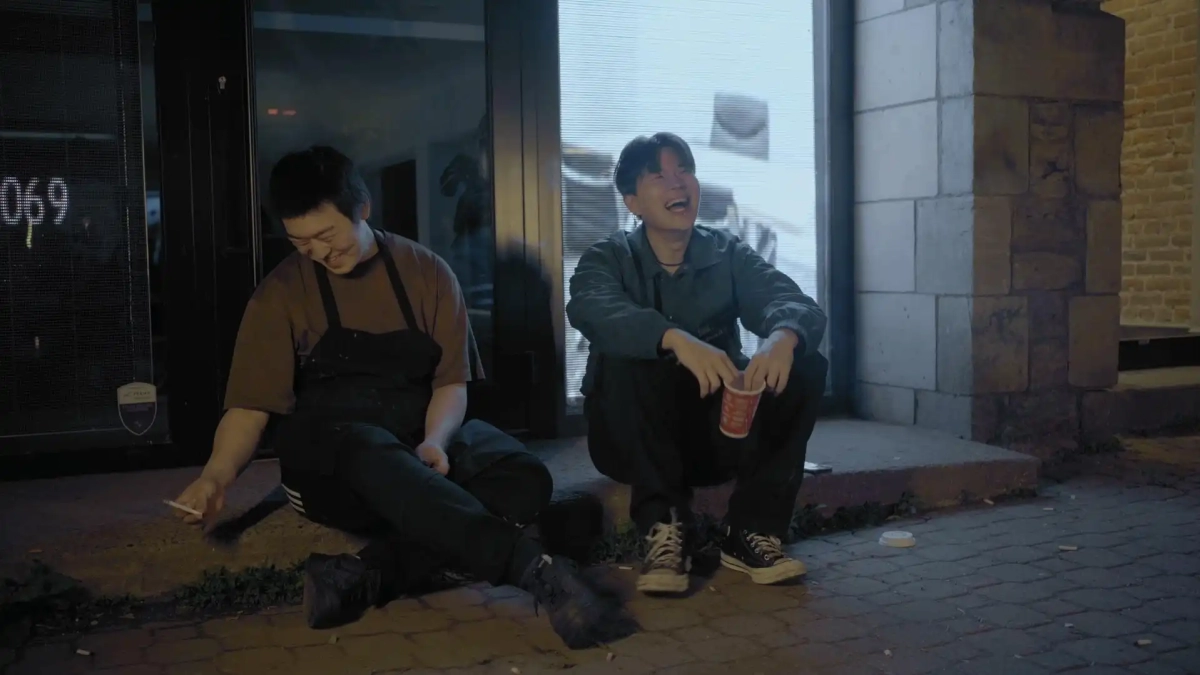The Asian American International Film Festival is now open for submissions for its 47th annual run in August 2024!
In anticipation of another stellar program, we’ve prepared a roundup of some of the gems we screened last year. What will we come up with next?

ETERNAL SUNDAY (周日永恒)
Watched by: Brittney Sy
“Eternal Sunday” explores Yuan (Dingchen Xiao) and Kelai’s (Yidi Wang) heart-wrenching romance brought to life through a virtual reality (VR) program called SUNDAY. The virtual program is the only way that people can interact with each other amid social distancing protocols during a nation-wide quarantine (sound familiar?) In the opening scene, the two lovers who are on the platform are at a crossroads in their relationship when suddenly, the country urgently calls for a nationwide shutdown of SUNDAY. The program causes nosebleeds and unknown long-term neural damage; SUNDAY’S degenerative health effects parallel similar warnings about the unknown long-term consequences of Artificial Intelligence/VR on humanity’s social, physical, and intellectual functioning from scientists like Stephen Hawking and Geoffrey Hinton.
The film follows Yuan as he fervently journeys to reach Kelai in person, reinforcing the message that human connections are meaningfully and sustainably formed online. The film explores the question – when virtual reality is sensory enough, how can we judge when the connections online aren’t real anymore?
Although the setting and themes of the film appear grim (an undertone further reinforced by the use of dark colors and saturation throughout), the film leaves a hopeful, everlasting message through Yuan’s selflessness, born out of his love for Kelai — love is worth the tremendous sacrifice, if we leap with faith across the chasm of uncertainty, bookended by lifelong regretful ‘what if’s’ on one end and enduring embrace on the other.
BREAKDOWN
Watched by: Brittney Sy
Love and loss are two of the essential and most excruciatingly painful experiences of the human condition.
“Breakdown” explores the parallel process of the breakdown of a relationship alongside the breakdown of our memories of it. When we love someone, our greatest fear is losing them, but perhaps we fear forgetting them even more. Our memories are the only tangible proof of the love and intimacy we once shared with someone.
In the short film, the woman disappears from the man’s life – metaphorically and literally – while he is left to grapple with the grief and loss. This begs the question – why do we love when we know the risk of loss? It’s scary to think about the fragility of relationships. It makes more logical sense to protect ourselves by not loving someone fully, because the very real possibility of losing that person will be that much more painful. We often operate based on a fear of loss.
In the unraveling of a relationship, we simultaneously experience the breakdown of our memories and the breakdown of parts of ourselves. The short film describes how the flowers of a dandelion are carried away by the billowing wind and arrive at a new destination to bloom. Much like picking up the pieces of ourselves and our memories of what once was after a loss, we create something new altogether, forever changed and impacted by our loves and our losses.

MĀYĀ
Watched by: Demi Guo
“If you’re only happy in a dream, Amma, do you think that counts?”
This is the question a daughter poses to her mother (Uma Movva), who prepares for the anniversary of her wedding. Grief takes center stage in “māyā,” directed by Samyuktha Movva, as the mother goes through the motions of lighting candles and braiding jasmine flowers, then wanders alone through her home, as though searching for her husband. Perhaps her daughter is gently begging her to move on.
In a film that is largely silent and built on ambience, one must focus on the visuals for storytelling: The colors of this bright home are muted, the quality of the footage slightly grainy, creating a dreamscape that tells us – because she will not say so herself – that the mother is living with a foot outside of reality. Only the jasmine flowers she braids, in all their whiteness, shine through, and her daughter’s voice pierces the veil of silence.
It’s a quiet film that takes into consideration how marriage and parenthood shape our lives – and the new reality we are plunged into when they no longer form our identities.

JOUISSANCE
Watched by: Demi Guo
In “Jouissance,” the lives of a couple, Arash and Rahi, is interrupted by the emergence of Sadeq – the ghost of Rahi’s ex-lover. Arash (Kiarash Dadgar), in a surprising turn of events, accepts that ghost into their lives, sharing space for the three of them.
There are multiple ways to interpret the dynamic that this creates. Director and writer Sadeq Es-haqi has produced films that explore gender and sexual identity in the past. Is it polyamory? Is it a love triangle? These circumstances give no clear answer. Honestly, we just want Arash and Rahi (Armin Khoshnik) – and perhaps Sadeq – to be happy. The affection and trust between Arash and Rahi jumps through the screen and begs for a happy ending, and Rahi’s grief and guilt over the deceased Sadeq is palpable.
Es-haqi has said in his director statement that this film is an exploration of magical realism in cinema, akin to the adaptations of Haruki Murakami’s literature. With that in mind, we can let the actors ground us in human emotion, and draw our own conclusions as to how we want their story to end.
DEATH & RAMEN
Watched by: Daniel Oliver Lee
While you may not be able to cheat death with a bowl of kimchi ramen, you can show him what it’s like to be alive. That’s what Tiger Ji’s “Death & Ramen,” a short film toeing the line between tragedy and buddy comedy, sets out to prove. The film follows the final night of Timmy (Bobby Lee), a depressed ramen chef after his concoction of Ambien and ramen fails to kill him by the time Death (Matt Jones) comes to collect his body. What follows is a deliciously dark and comedic romp as Timmy befriends Death and sets out to finish his business before he passes on. The two share each other’s company over bowls of kimchi ramen and visit Timmy’s mother one final time before pinky promising on a roof, dancing their way to the afterlife.
“Death & Ramen” masterfully fuses its dark subject matter with the stylings of a buddy comedy, and creates a beautifully balanced tragicomedy that aims to lessen the taboo surrounding the subject of death. A key component of this balance is the pitch-perfect performances delivered by Lee and Jones, whose chemistry builds a superb comedic rapport. Lee finds an alluring equilibrium between Timmy’s moments of absurd mania and more grounded moments of somber emotion, masterfully navigating the character’s beats — from smashing his head against a window to saying goodbye to his mother. Jones delivers a bizarrely personable take on Death, a choice Ji made to soften the inherent tragedy in the story. Ji notes that “If we present the Grim Reaper as a comedic being, capable of pity, friendship, and enjoying a nice bowl of ramen, then the existential theme will be easier to access.”
By viewing this film, Ji hopes that we mortals may be able to recognize the fleeting beauty of life, the experiences it holds, and ultimately he hopes that, “maybe we can learn to enjoy a nice bowl of ramen.”
UP ALL NIGHT
Watched by: Daniel Oliver Lee
“Every day is like writing a song. Sometimes it shines, sometimes it rains, and sometimes it breaks my heart. And eventually, you take these pieces of you and sell them for a greater cause.” This is the synthesis of Andrew The-Ahn Luk’s directorial debut “Up All Night,” a windingly whimsical exploration of Jay (Maruco), a young Korean Canadian pining for a music career, as he floats around the evening in Montreal. We meet Jay, a former K-Pop trainee, after he receives a hoax call concerning an audition for the idol group Super Top Dog 5. What follows is a string of vignettes investigating both Jay’s relationship with himself and how he is perceived by those around him. Surrounded by mounting pressure from his mother, the “Korean new wave in the media,” and himself, Jay grapples with the humorous and bittersweet “machinery of life.”
“Up All Night” serves as a lively and textured study of director Luk’s friend and star of the film Jay, otherwise known by his artist name Maruco. Luk found himself inspired to write the film after Jay left his substantial following on TikTok behind to pursue his dream music career. Taking notes from his own relationship with his mother, as well as Jay’s, Luk infuses the story with a multi-generational angle, meditating on how our wish to make our parents proud intensifies our need to actualize our artistic dreams. Inspired by directors such as Hong Sang-Soo, Luk focused on structuring Jay’s story through a chronological framing device. “I wanted to play with this kind of whimsical timeline and also create a feeling of a dream, like something that’s surreal because a lot of it feels surreal,” he said. This surreal feeling is compounded by a myriad of textured and inventive shots, ranging from colorful arcades, and fish eye lens one-shots, to Wong Kar-wai-inspired slow shutter sequences, all captured magnificently by cinematographer Aloh Vera.
Through his work as a filmmaker, Luk hopes to showcase the multifaceted nature of the Asian diaspora. “I think we’re lacking this perspective,” he said. “I want to explore little corners that we haven’t explored yet as Asian artists.”
EID MUBARAK
Watched by: Daniel Oliver Lee
Manhoor Euceph’s directorial debut exhibits the monumental lesson that being a big girl involves putting on a brave face to learn “where your meat comes from.” “Eid Mubarak” sees Iman (Rubab Rasheed), a privileged Pakistani girl, plot to save her beloved goat Barfi from being sacrificed and eaten by her family on the Muslim holiday of Eid al-Azha. We observe Iman as her family prepares to celebrate the Feast of Sacrifice, following her from the moment she picks Barfi out and names him to her final goodbye after he becomes her dinner. Through her failed mission to rescue Barfi, Iman ultimately hits a cardinal coming-of-age milestone as she learns the meaning of sacrifice.
“Eid Mubarak” is told brilliantly through the six-year-old eyes of Iman, painting its “candy-colored” world in a visually amusing palette of bright colors with the dominant hue of pink in many frames. We experience everything as Iman does, from the towering dollhouse nature of her home to the animated retelling of Ibrahim and his son. As Iman’s mother recounts the story, Iman visualizes the plot through a stunning sequence of paper cut-out animation comprised of watercolor illustrations by animator Ricardo Muñoz. Euceph drew upon her own childhood experiences, deciding to tell this story from a child’s perspective, utilizing “the coming of age/loss of innocence drama as a tabula rasa technique,” with an aim to present what she describes as a personal story for millions of Muslim children to Western audiences. Rounding out the stellar direction and artistic elements of the film is the lead, Rubab Rasheed, who carries the film through its whimsical sequences and heavier emotional beats, delivering a masterfully tender performance as Iman.
Created by a team of both American and Pakistani artisans, the filmmakers hope to bring a universal Muslim experience to the Western mainstream and, “create bridges of understanding across cultures.”
The above films screened at the 46th Asian American International Film Festival.

